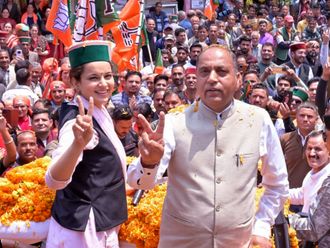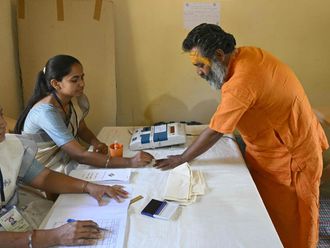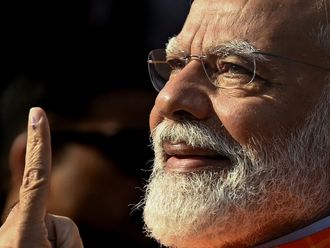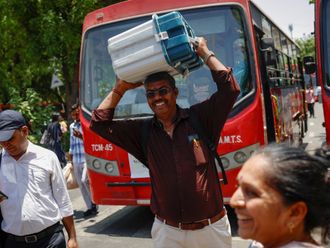MAJOR GENERAL SATBIR SINGH (RETIRED), leader of the OROP movement
New Delhi: The soldiers are engaged in a bitter battle — but not on the border to protect the nation, but at Jantar Mantar, the protest site in Central Delhi, to ask for their rights.
The ex-servicemen’s demand for ‘One Rank One Pension’ (OROP) scheme has been in the air for more than 40 years. It envisages a uniform pension for the defence personnel who retire in the same rank with the same length of service, irrespective of their date of retirement.
There is a sense of urgency to it now as Prime Minister Narendra Modi, in his Independence Day speech, claimed that OROP reform was accepted in principle and that only work on the modalities remain.
But every now and then, efforts to break the deadlock between the government and ex-servicemen over the demand of the implementation of the scheme fail. The issue gained ground as veteran defence personnel undertook the fast unto death at the site where they have been protesting for more than two months. Until now, four of them have been hospitalised after their condition deteriorated.
Major General Satbir Singh (Retired), one of the leaders of the OROP movement says, “While the protectors of the country should be given the right to lead their life in the best possible manner, the government is hell-bent to shortchange us.”
He speaks to Gulf News in an exclusive interview.
GULF NEWS: Why is the government still not ready to implement OROP?
MAJOR GENERAL SATBIR SINGH: It is unfortunate that OROP’s fate is still hanging, despite the fact that the government more than a year ago sanctioned it. The bureaucracy is putting hurdles to ensure that OROP is diluted, delayed and finally denied to the soldiers. At the last moment they are putting in irrelevant points, which stand legal, administrative and financial scrutiny. The saddest part is that it is all happening to the soldiers, several of whom have lost their lives and limbs protecting their motherland.
Does that mean, instead of the politicians, the bureaucrats are playing politics?
They are not playing politics. They are scheming and cheating to ensure the military is pulled down and not given their due. Even though a political decision is required for OROP sanction, sadly, in our democratic system, the bureaucrats have been calling the shots and the parliamentarians are listening to them.
What is the government offering now?
What we are being offered will defeat the very definition of OROP. For instance: the government wants 2011 to be the base year besides no three per cent annual increase, as we are demanding. They say we would provide an increase once in 5 to 10 years. Also, they want payments to begin from April 1, 2015 as against the agreed day of April 1, 2014. These points are unacceptable to us. That’s because in the second year itself a junior defence person will start drawing more pension than the senior. We want that every year the pensions should be equalled. But they don’t want to do this.
This shows there’s many a slip between the sanction and the implementation. But doesn’t it also denote there’s lot of imbalance between the pension provided to civil servants as compared to their military counterparts?
Precisely. But this slip is only in the case of the defence personnel. When the government sanctioned it, did they not go into the details? The defence minister had approved the proposal and the government’s draft was accepted totally by the three services — army, navy and air force. But now they want us to ignore the disparity. For example: An Indian administrative services (IAS) officer becomes a joint secretary after 16 years of service. So, they should equate that with the designation of a Lieutenant Colonel. But no, they are equating it with a Major General, who gets this designation after putting in 32 years of service. This sure isn’t justifiable.
But when parliamentarians vote themselves for a pay raise frequently, why are bureaucrats ignoring those protecting the nation?
Yhen politicians want benefits for themselves, they are able to do so within days. But in our case, whole lot of computations are being carried out. And as far as bureaucrats are concerned, they have indirectly given themselves OROP, just as it is in the case of others — from clerks to judges. But as the thought process of the government goes, only military people should suffer.
So what is your next move?
We will continue our agitation. But despite all that is being done to us, we don’t want to get into any slanging match with anyone. Our aim is the interest of the soldiers and we want to serve the country, whether in service or after retirement. We soldiers are of a different mindset. We believed what was said by the Prime Minister in his address to the nation and still have faith in him. But the bureaucracy is mishandling the entire issue and we expect the Prime Minister to see through things. He had emphasised on three points — building of a martyrs’ memorial, establishing an ex-servicemen’s commission and implementation of OROP scheme. But the government has now denied them all.
Won’t the morale of the armed forces, especially the younger generation, get affected seeing their elders being forced to sit on hunger strike for their cause?
No, I won’t accept that, because if and when the occasion demands, our soldiers will never let monetary or any other issue come in the way of their duty towards the nation. But yes, if issues like OROP are not resolved, the most suitable youth, meant to join the defence forces, may not offer themselves for the services. It needs to be understood that not everyone can become a soldier. A person who offers to become one, has a different temperament and needs the basic qualities of the head and the heart.
BOX
• Over two million ex-servicemen and over 600,000 war widows stand to be the immediate beneficiaries of the OROP scheme, if implemented.
• Currently, the pension for retired personnel is based on the Pay Commission recommendations of the time when he or she retired.
• So, a Major General, who retired in 1996, draws less pension than a Lieutenant who retired the same year and less pension than a Lieutenant Colonel who retired after 1996.
• About 85 per cent of the country’s army men (personnel below officer rank) have to leave the force around the age of 35, whereas paramilitary and police forces serve till about the age of 60.
• Compared to army men, they get 25 more increments. They see the implementation of two to three pay commissions during their career. And get Rs80 million (Dh4.44 million) more than army personnel till the age of 70, by way of salary and pension.












